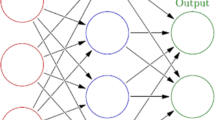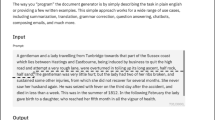Abstract
An artificial grammar learning experiment is reported which investigated whether three types of information are learned during this kind of task: information about the positions of single letters, about fragments of training strings, and about entire training strings. Results indicate that participants primarily learned information about string fragments and, to a lesser extent, information about positions of letters. Two connectionist models, an autoassociator and a simple recurrent network (SRN), were tested on their ability to account for these results. In the autoassociator simulations, similarity of test items to entire training items had a large effect, which was at variance with the experimental results. The results of the SRN simulations almost perfectly matched the experimental ones.
Similar content being viewed by others
Author information
Authors and Affiliations
Additional information
Received: 22 September 1998 / Accepted: 22 February 1999
Rights and permissions
About this article
Cite this article
Kinder, A. The knowledge acquired during artificial grammar learning: Testing the predictions of two connectionist models. Psychological Research Psychologische Forschung 63, 95–105 (2000). https://doi.org/10.1007/s004260000038
Issue Date:
DOI: https://doi.org/10.1007/s004260000038




